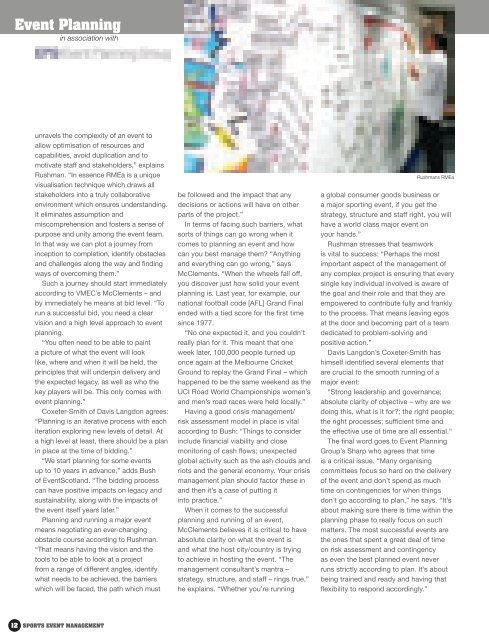sports event management - FIFA/CIES International University Network
sports event management - FIFA/CIES International University Network
sports event management - FIFA/CIES International University Network
- No tags were found...
You also want an ePaper? Increase the reach of your titles
YUMPU automatically turns print PDFs into web optimized ePapers that Google loves.
Event Planningin association withunravels the complexity of an <strong>event</strong> toallow optimisation of resources andcapabilities, avoid duplication and tomotivate staff and stakeholders,” explainsRushman. “In essence RMEa is a uniquevisualisation technique which draws allstakeholders into a truly collaborativeenvironment which ensures understanding.It eliminates assumption andmiscomprehension and fosters a sense ofpurpose and unity among the <strong>event</strong> team.In that way we can plot a journey frominception to completion, identify obstaclesand challenges along the way and findingways of overcoming them.”Such a journey should start immediatelyaccording to VMEC’s McClements – andby immediately he means at bid level. “Torun a successful bid, you need a clearvision and a high level approach to <strong>event</strong>planning.“You often need to be able to painta picture of what the <strong>event</strong> will looklike, where and when it will be held, theprinciples that will underpin delivery andthe expected legacy, as well as who thekey players will be. This only comes with<strong>event</strong> planning.”Coxeter-Smith of Davis Langdon agrees:“Planning is an iterative process with eachiteration exploring new levels of detail. Ata high level at least, there should be a planin place at the time of bidding.”“We start planning for some <strong>event</strong>sup to 10 years in advance,” adds Bushof EventScotland. “The bidding processcan have positive impacts on legacy andsustainability, along with the impacts ofthe <strong>event</strong> itself years later.”Planning and running a major <strong>event</strong>means negotiating an ever-changingobstacle course according to Rushman.“That means having the vision and thetools to be able to look at a projectfrom a range of different angles, identifywhat needs to be achieved, the barrierswhich will be faced, the path which mustbe followed and the impact that anydecisions or actions will have on otherparts of the project.”In terms of facing such barriers, whatsorts of things can go wrong when itcomes to planning an <strong>event</strong> and howcan you best manage them? “Anythingand everything can go wrong,” saysMcClements. “When the wheels fall off,you discover just how solid your <strong>event</strong>planning is. Last year, for example, ournational football code [AFL] Grand Finalended with a tied score for the first timesince 1977.“No one expected it, and you couldn’treally plan for it. This meant that oneweek later, 100,000 people turned uponce again at the Melbourne CricketGround to replay the Grand Final – whichhappened to be the same weekend as theUCI Road World Championships women’sand men’s road races were held locally.”Having a good crisis <strong>management</strong>/risk assessment model in place is vitalaccording to Bush: “Things to considerinclude financial viability and closemonitoring of cash flows; unexpectedglobal activity such as the ash clouds andriots and the general economy. Your crisis<strong>management</strong> plan should factor these inand then it’s a case of putting itinto practice.”When it comes to the successfulplanning and running of an <strong>event</strong>,McClements believes it is critical to haveabsolute clarity on what the <strong>event</strong> isand what the host city/country is tryingto achieve in hosting the <strong>event</strong>. “The<strong>management</strong> consultant’s mantra –strategy, structure, and staff – rings true,”he explains. “Whether you’re runningRushmans RMEaa global consumer goods business ora major sporting <strong>event</strong>, if you get thestrategy, structure and staff right, you willhave a world class major <strong>event</strong> onyour hands.”Rushman stresses that teamworkis vital to success: “Perhaps the mostimportant aspect of the <strong>management</strong> ofany complex project is ensuring that everysingle key individual involved is aware ofthe goal and their role and that they areempowered to contribute fully and franklyto the process. That means leaving egosat the door and becoming part of a teamdedicated to problem-solving andpositive action.”Davis Langdon’s Coxeter-Smith hashimself identified several elements thatare crucial to the smooth running of amajor <strong>event</strong>:“Strong leadership and governance;absolute clarity of objective – why are wedoing this, what is it for?; the right people;the right processes; sufficient time andthe effective use of time are all essential.”The final word goes to Event PlanningGroup’s Sharp who agrees that timeis a critical issue. “Many organisingcommittees focus so hard on the deliveryof the <strong>event</strong> and don’t spend as muchtime on contingencies for when thingsdon’t go according to plan,” he says. “It’sabout making sure there is time within theplanning phase to really focus on suchmatters. The most successful <strong>event</strong>s arethe ones that spent a great deal of timeon risk assessment and contingencyas even the best planned <strong>event</strong> neverruns strictly according to plan. It’s aboutbeing trained and ready and having thatflexibility to respond accordingly.”12 SPORTS EVENT MANAGEMENT
















